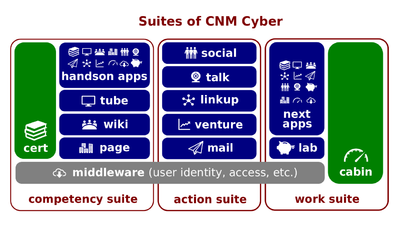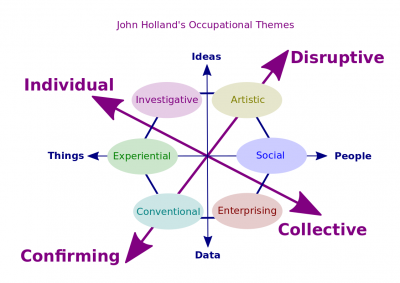Difference between revisions of "Nature of Occupations"
(→Outline) |
|||
| (13 intermediate revisions by 2 users not shown) | |||
| Line 1: | Line 1: | ||
| − | [[File:Cnm-digital.png|400px|thumb|right|[[ | + | [[File:Cnm-digital.png|400px|thumb|right|[[CNMCyber suite]]s]]The [[Nature of Occupations]] (hereinafter, the ''Lesson'') is the [[lesson]] of [[CNMCyber]] that introduces its participants to [[occupation]]s and related topics. The ''Lesson'' belongs to the '''[[Introduction to Employment]]''' session of [[EmployableU Concepts]]. |
| − | The ''Lesson'' is made up of | + | The ''Lesson'' is made up of four [[lectio]]s. At [[CNMCyber]], the word, [[lectio]], is used for a lesson part. |
| Line 15: | Line 15: | ||
|- | |- | ||
![[What Occupation Is]] | ![[What Occupation Is]] | ||
| − | |1|| | + | |1||[[Occupation]], [[Occupational Information Network]], [[Occupational Outlook Handbook]] |
|- | |- | ||
![[Personalities and Work]] | ![[Personalities and Work]] | ||
| − | |2|| | + | |2||[[Personality]], [[Myers-Briggs Type Indicator]] ([[Myers-Briggs Type Indicator|MBTI]]) |
|- | |- | ||
| − | ![[Occupational | + | ![[Occupational Interests]] |
| − | |3|| | + | |3||[[Holland Occupational Themes]], [[realistic occupation]], [[investigative occupation]], [[artistic occupation]], [[social occupation]], [[enterprising occupation]], [[conventional occupation]], [[occupational interest]] |
|- | |- | ||
![[Core Occupations]] | ![[Core Occupations]] | ||
| − | |4|| | + | |4||[[Occupation list]], [[assistant]], [[clerk]], [[consultant]], [[laborer]], [[manager]], [[operator]], [[originator]], [[service worker]] ([[social service worker]], [[pink-collar worker]]), [[specialist]], [[technician]], [[trades worker]] |
|} | |} | ||
===Successor=== | ===Successor=== | ||
| − | :The successor lesson is [[Work | + | :The successor lesson is [[Nature of Work]]. |
==2019 Occupations presentation== | ==2019 Occupations presentation== | ||
| − | The video of the presentation is published | + | The video of the presentation is published on https://youtu.be/bVNQOFVsPyQ (6:09). Here is its full text. |
===Overview=== | ===Overview=== | ||
| Line 64: | Line 64: | ||
===Summary=== | ===Summary=== | ||
| − | :This concludes the ''Nature Of Occupations'' presentation. We have defined an [[occupation]] and used [[Holland Occupational Themes]] to take a look at various natures of [[occupation]]s including [[Realistic occupation|realistic]], [[Investigative occupation|investigative]], [[Artistic occupation|artistic]], [[Social occupation|social]], [[Enterprising occupation|enterprising]], and [[conventional occupation]]s. If you haven't done yet so, you are now welcome to move to [[Work | + | :This concludes the ''Nature Of Occupations'' presentation. We have defined an [[occupation]] and used [[Holland Occupational Themes]] to take a look at various natures of [[occupation]]s including [[Realistic occupation|realistic]], [[Investigative occupation|investigative]], [[Artistic occupation|artistic]], [[Social occupation|social]], [[Enterprising occupation|enterprising]], and [[conventional occupation]]s. If you haven't done yet so, you are now welcome to move to [[Nature of Work]]. |
| − | |||
| − | |||
| − | |||
| − | |||
[[Category: Orientation Curriculum]][[Category:Presentations]] | [[Category: Orientation Curriculum]][[Category:Presentations]] | ||
Latest revision as of 19:33, 29 October 2023
The Nature of Occupations (hereinafter, the Lesson) is the lesson of CNMCyber that introduces its participants to occupations and related topics. The Lesson belongs to the Introduction to Employment session of EmployableU Concepts.
The Lesson is made up of four lectios. At CNMCyber, the word, lectio, is used for a lesson part.
Summaries
Predecessor
- The predecessor lesson is Industries and Specialties.
Outline
Successor
- The successor lesson is Nature of Work.
2019 Occupations presentation
The video of the presentation is published on https://youtu.be/bVNQOFVsPyQ (6:09). Here is its full text.
Overview
- Welcome to Nature Of Occupations. In this brief presentation, we are going to take a look at natures of various occupation and the most popular attempt to classify them called Holland Occupational Themes. Let's go ahead.
What an occupation is
- Occupation is a regular activity that a person undertakes in order to earn his/her livelihood. An occupation theme can be defined as the unifying subject of the type of an occupation. The subject impacts preferences for work environments and outcomes. Here there is no any single classification of different things or types of occupations.
John Holland's Occupational Themes
- The most popular came from the works of an American psychologist John Holland. He tried to match occupations with personalities and he studied personalities first and he found that some personalities are more disruptive, some are more conforming, some are more individual, some are more collective and he chunked personality types in six buckets which are artistic, social, enterprise, conventional, experiential and investigative. Every personality has not only one dimension but could be two or more and as the personality classification didn't really work but for occupations basically became the most popular classification.
Experiential occupations
- Starting with Experiential potential. Initially drawn a horn called it motoric occupation and later he changed it to realistic occupation. Evidential potential is any occupation that frequently involves work activities that include practice hands on problems and solutions and in this bucket came a carpenter, engineer, farmer etc. Collectively they may be called doers, in ancient times they would have been hunters.
Investigative occupations
- Investigative occupations which John Holland initially called intellectual is an occupation that frequently involves working with ideas that requires an extensive amount of thinking. In this bucket goes an auditor, business analyst, compliance officer, cost estimator, editor, inspector, interviewer and a lawyer. Collectively they may be called thinkers.
Artistic occupations
- In artistic occupation, initially known as esthetic occupation is the occupation that frequently involves working the forms, designs and patterns. In this bucket will go an artist, composer, designer, enterpriser, architect and a creative writer. Collectively they may be called innovators. In ancient times they would have been artisans.
Social occupations
- Social occupation or initially it was called supportive, is an occupation that frequently involves working with and communicating with and teaching people. This occupation often involves helping or providing services to others. In this bucket will go a carrier councilor, job coach, sales representative and teacher. Collectively they may be called helpers and in ancient times they could be deemed healers.
Enterprising occupations
- Enterprise Occupation, initially it was called persuasive occupation. It is an occupation which frequently involves starting up and carrying out projects. In this bucket will go an architect, project owner and self-employed. Collectively they may be called creators and in ancient times they would have been leaders.
Conventional occupations
- Finally, Conventional Occupation, initially known as conforming. This is an occupation that frequently involves following set procedures and routines. In this bucket will go an accountant, administrative assistant, book keeper, document management specialist and technical writer. Collectively they may be called organizers. In ancient times they would have been guardians.
Sets of dimensions
- Here are two different sets of dimensions, one is working ideas verses data and people verses things and clearly social works more with people and experiential or realistic work more with things. Ideas, we have artistic and investigative. So artistic basically create ideas and investigative find ideas or find what's there behind the ideas and data. Enterprise and conventional, interestingly enterprising is not in ideas, enterprising is between people and data. It's more of persuasive, working with people and data. That's it for occupational themes. Next we will look at conditions of work.
Summary
- This concludes the Nature Of Occupations presentation. We have defined an occupation and used Holland Occupational Themes to take a look at various natures of occupations including realistic, investigative, artistic, social, enterprising, and conventional occupations. If you haven't done yet so, you are now welcome to move to Nature of Work.

